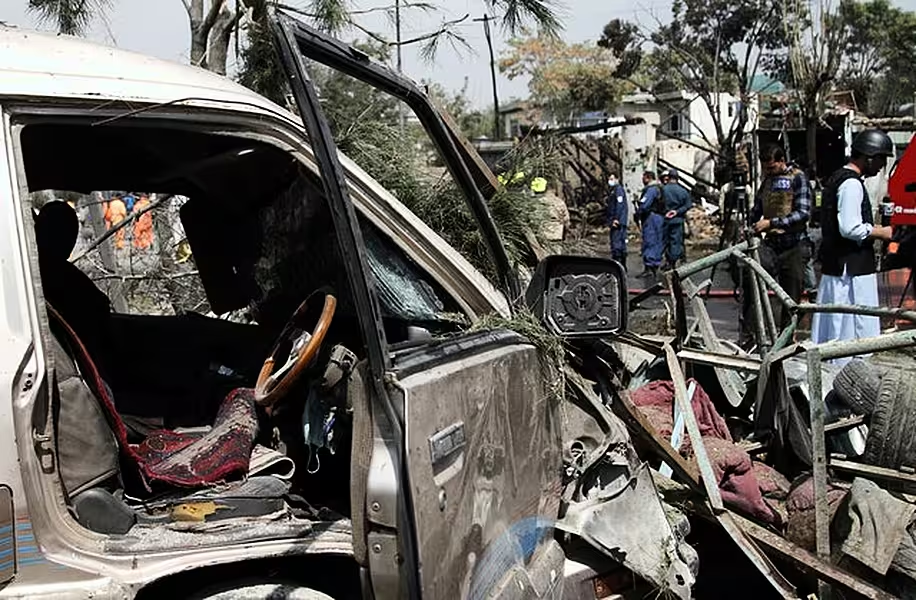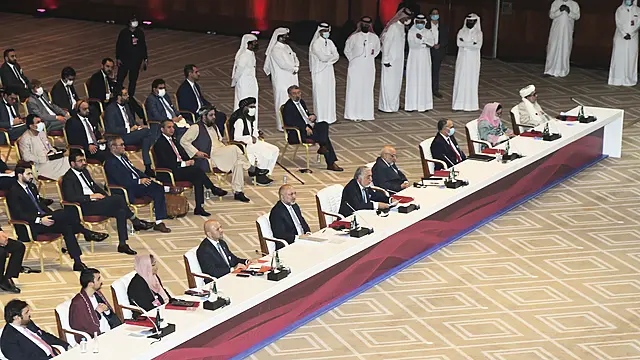US secretary of state Mike Pompeo attended the opening ceremony in Qatar, where the meetings will take place.
It is the latest in a flurry of diplomatic activity by the Trump administration ahead of the US presidential election in November.
Good to be in Doha for important Afghanistan peace negotiations. The people of Afghanistan deserve a country that isn't at war, and we are here to support them in building a roadmap to a peaceful future. pic.twitter.com/fdwo8x0gwE
— Secretary Pompeo (@SecPompeo) September 11, 2020
The discussions are important in the search for lasting peace that will also provide an exit for US and Nato troops after nearly 19 years.
The sides will try to tackle tough issues including the terms of a permanent ceasefire, the rights of women and minorities and the disarming of tens of thousands of Taliban fighters and militias loyal to warlords, some of them aligned with the government.
The talks in Doha follow the US-brokered recognition of Israel by two Gulf nations – Bahrain on Friday and the United Arab Emirates earlier this month.
The Afghan sides are also expected to discuss constitutional changes and power-sharing.
Even seemingly mundane issues like the flag and the name of the country – the Islamic Republic of Afghanistan or, as the Taliban’s administration had been known when it ruled, the Islamic Emirate of Afghanistan – could roil tempers as they find their way on to the negotiation table.

Among the government-appointed negotiators are four women, who vow to preserve women’s rights in any power-sharing deal with the fundamentalist Taliban.
This includes the right to work, education and participation in political life – all denied women when the Taliban ruled Afghanistan for five years.
The Taliban were ousted in 2001 by a US-led coalition for harbouring Osama bin Laden, the architect of the September 11 terrorist attacks on America.
There are no women on the Taliban’s negotiation team, led by their chief justice Abdul Hakim.
Mr Pompeo has said he expected the discussions to be contentious.
Washington’s peace envoy for Afghanistan, Zalmay Khalilzad, said on Friday that launching the talks is an important achievement, but that “there are difficulties, significant challenges on the way to reaching agreement”.
He said: “This is a test for both sides, for the Taliban and the government.
“Can they reach an agreement despite differences, in terms of their visions for the future of Afghanistan?”

The intra-Afghan negotiations were laid out in a peace deal Washington signed with the Taliban on February 29.
At that time the deal was touted as Afghanistan’s best chance at peace in 40 years of war.
The talks were originally expected to begin within weeks of the February 29 signing.
But delays disrupted the timeline from the outset. The Afghan government baulked at releasing 5,000 Taliban prisoners, which was stipulated in the deal as a sign of good faith ahead of the negotiations.
The Taliban were required to release 1,000 government and military personnel in their custody.

Political turmoil in Kabul further delayed talks as Afghan president Ashraf Ghani and his rival in controversial presidential polls the year before, Abdullah Abdullah, squabbled over who won, with both declaring victory.
Mr Abdullah was named to head the High Council for National Reconciliation overseeing the peace talks as part of a power-sharing agreement to end the bickering.
The Taliban’s refusal to reduce the violence further hindered the start of talks.
While Washington ramped up pressure to get the intra-Afghan negotiations started, the deal they signed with the Taliban to withdraw completely from Afghanistan does not hinge on the success of the talks.
Washington’s withdrawal is contingent on the Taliban honouring commitments to fight terrorist groups, in particular the so-called Islamic State affiliate in Afghanistan, and ensure that Afghanistan cannot again be used to attack America or its allies.
Washington has refused to give specifics of the guarantees citing security reasons, but the withdrawal of US troops has already begun.
President Donald Trump has said that by November, about 4,000 soldiers will be in Afghanistan, down from 13,000 when the deal was signed in February.







